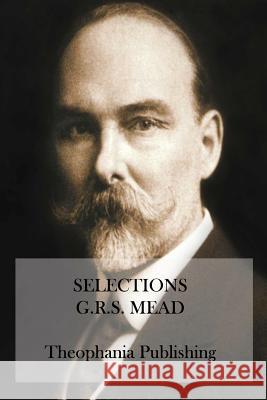Selections: Essays of G.R.S. Mead » książka
Selections: Essays of G.R.S. Mead
ISBN-13: 9781515336839 / Angielski / Miękka / 2015 / 110 str.
George Robert Stowe Mead was an English author, editor, translator, and an influential member of the Theosophical Society as well as the founder of the Quest Society. While still at Cambridge University Mead read Esoteric Buddhism by Alfred Percy Sinnett. This comprehensive theosophical account of the eastern religion prompted Mead to contact two theosophists in London named Bertam Keightly and Mohini Chatterji, which eventually led him to join the Theosophical Society. Mead became a member of Helena Petrovna Blavatsky's Theosophical Society in 1884. He abandoned his teaching profession in 1889 to be Blavatsky's private secretary and also became a joint-secretary of the Esoteric Section (E.S.) of the Theosophical Society. The E.S. was for those whom the Theosophical Society deemed more advanced. G.R.S Mead received Blavatsky's six Esoteric Instructions and other teachings at twenty-two meetings headed by Blavatsky which were only attended by the Inner Group of the Theosophical Society. It was because of the intimacy Mead felt with the Inner Group that he married Laura Cooper in 1899. Contributing intellectually to the Theosophical Society, at first most interested in eastern religions, he quickly became more and more attracted to western esotericism of religion and philosophy, particularly Neoplatonism, Gnosticism and Hermeticism, though his scholarship and publications continued to engage with eastern religion. Making many contributions to the Theosophical Society's Lucifer as joint editor, he eventually became the sole editor of The Theosophical Review in 1907 (as Lucifer was renamed in 1897). As of February 1909, Mead and some seven-hundred members of the Theosophical Society's British Section resigned in protest of Annie Besant's reinstating of Charles Webster Leadbeater to membership in the society. Leadbeater had been a prominent member of the Theosophical Society until he was accused in 1906 of teaching masturbation to the sons of some American Theosophists under the guise of occult training. While this prompted Mead's resignation, his frustration at the dogmatism of the Theosophical Society may also have been a major contributor to his break with the society. He had been a member for twenty-five years.
Zawartość książki może nie spełniać oczekiwań – reklamacje nie obejmują treści, która mogła nie być redakcyjnie ani merytorycznie opracowana.











